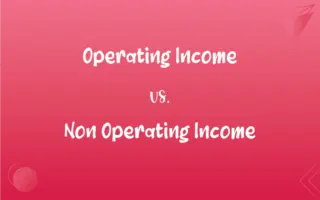Debate vs. Dialogue: What's the Difference?
By Janet White || Published on December 3, 2023
Debate is a structured argument where parties present opposing views, often competitively, while dialogue is an open-ended, cooperative discussion aimed at understanding and exploring various perspectives.

Key Differences
Debate involves opposing sides presenting and defending their arguments, often with the goal of persuading an audience or judge. However, dialogue is a conversational process where participants aim to share and understand different perspectives without the pressure to persuade.
In a debate, the focus is on winning the argument or proving a point, which can lead to a more confrontational tone. Dialogue emphasizes listening and understanding, fostering a more collaborative and respectful atmosphere.
Debates are usually structured with specific rules and formats, focusing on logic and evidence to support arguments. While, dialogue allows for a more flexible, free-flowing conversation, often exploring ideas and feelings rather than just facts.
During a debate, participants may be less open to changing their viewpoints, as the objective is to strengthen their own position. In dialogue, there is often more openness to new ideas and the possibility of changing one’s perspective.
Debate is commonly used in educational, political, or legal settings to examine issues in a formal manner. Dialogue is often employed in conflict resolution, community discussions, and collaborative projects to build understanding and consensus.
ADVERTISEMENT
Comparison Chart
Primary Goal
To persuade or win an argument
To understand and explore perspectives
Tone
Competitive, confrontational
Cooperative, respectful
Structure
Formal, rule-based
Informal, open-ended
Focus
Logic and evidence
Ideas, feelings, and shared understanding
Outcome
Winning or losing a point
Building consensus or mutual understanding
ADVERTISEMENT
Debate and Dialogue Definitions
Debate
A formal discussion on a particular topic where opposing arguments are presented.
The presidential candidates faced off in a televised debate.
Dialogue
A conversation between two or more people to exchange ideas or opinions.
Their dialogue about cultural differences was enlightening.
Debate
A regulated argument between two parties with differing views.
They entered a debate about the merits of renewable energy.
Dialogue
An interactive exchange of views and ideas in a respectful manner.
The conference facilitated dialogue among diverse participants.
Debate
A competitive discourse aiming to persuade or convince.
The debate team practiced rigorously for the national competition.
Dialogue
An open-ended discussion aiming for mutual understanding.
The company encouraged dialogue between management and staff.
Debate
An exchange of views with the intent of establishing the truth.
Philosophers often engage in debates about existential questions.
Dialogue
A process of shared exploration towards greater understanding.
Their dialogue led to unexpected insights about the project.
Debate
A public discussion or argument about a specific issue.
The community held a debate on local school funding.
Dialogue
A cooperative discussion for problem-solving or conflict resolution.
They entered into a dialogue to resolve their misunderstandings.
Debate
To consider something; deliberate.
Dialogue
A conversation between two or more people.
Dialogue
A discussion of positions or beliefs, especially between groups to resolve a disagreement.
FAQs
Do debates require a winner?
In formal settings, debates often aim to determine a winner, but not always.
What is the main purpose of a debate?
To present and defend opposing viewpoints in a structured format.
Are debates effective in education?
Debates can be effective in education for developing critical thinking and argumentation skills.
Can dialogue be informal?
Yes, dialogue is often informal and conversational.
Can dialogue occur in a professional setting?
Yes, dialogue is encouraged in professional settings for collaborative problem-solving.
Is emotional expression common in dialogue?
Yes, dialogue often involves sharing and understanding emotions.
Can dialogue lead to decision-making?
Yes, dialogue can lead to informed decision-making through mutual understanding.
How is dialogue used in conflict resolution?
Dialogue helps parties in conflict understand each other's perspectives to find common ground.
Can a debate turn into a dialogue?
Yes, if participants shift from arguing to understanding, a debate can evolve into a dialogue.
Is debate always confrontational?
While debate is often competitive, it doesn't always have to be confrontational.
What skills are important for effective dialogue?
Listening, empathy, and open-mindedness are key for effective dialogue.
How does dialogue contribute to community building?
Dialogue fosters understanding and cooperation, essential for community building.
Are all debates public?
Not all debates are public; some can occur in private settings.
How can one improve their dialogue skills?
By practicing active listening, asking open-ended questions, and showing empathy.
Do debates focus on facts or opinions?
Debates often focus on facts, though they can include subjective opinions.
Can debates be harmful?
If not conducted respectfully, debates can entrench divisions rather than enlighten.
Is it possible to have a one-sided debate?
A debate typically requires at least two differing viewpoints.
Can dialogue resolve deep-seated conflicts?
Dialogue can be a powerful tool for addressing and resolving deep-seated conflicts.
Are debates timed?
Formal debates usually have time limits for arguments.
How do cultural differences impact dialogue?
Cultural differences can provide diverse perspectives, enriching the dialogue.
About Author
Written by
Janet WhiteJanet White has been an esteemed writer and blogger for Difference Wiki. Holding a Master's degree in Science and Medical Journalism from the prestigious Boston University, she has consistently demonstrated her expertise and passion for her field. When she's not immersed in her work, Janet relishes her time exercising, delving into a good book, and cherishing moments with friends and family.































































